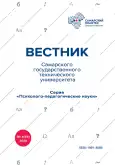Особенности организации электронного обучения в современном вузе
- Авторы: Баканова И.Г.1,2, Яворчикова Я.3
-
Учреждения:
- Самарский государственный университет путей сообщения
- Самарский государственный технический университет
- Университет им. Матея Бела
- Выпуск: Том 17, № 4 (2020)
- Страницы: 5-15
- Раздел: Направления модернизации образования
- URL: https://journal-vniispk.ru/1991-8569/article/view/59540
- DOI: https://doi.org/10.17673/vsgtu-pps.2020.4.1
- ID: 59540
Цитировать
Полный текст
Аннотация
Широкое использование методов электронного обучения на основе перспективных информационных и телекоммуникационных, современных педагогических технологий является одним из значимых направлений функционирования системы образования сегодня. В статье рассматривается актуальность применения электронного обучения в данный момент времени, его возможности в формировании у обучающихся большого количества компетенций, необходимых для их успешного профессионального становления. Представлены возможности LMS (Learning Management System) системы управления учебным контентом Moodle для реализации приоритетной цели системы высшего образования. Показана необходимость использования системы управления электронным обучением в целях предоставления качественного образования на примере разработанного электронного курса «Иностранный язык» для студентов – будущих инженеров.
Полный текст
Открыть статью на сайте журналаОб авторах
Ирина Геннадьевна Баканова
Самарский государственный университет путей сообщения; Самарский государственный технический университет
Автор, ответственный за переписку.
Email: backanovairina@yandex.ru
кандидат педагогических наук, доцент кафедры «Лингвистика», доцент кафедры «Иностранные языки»
Россия, СамараЯна Яворчикова
Университет им. Матея Бела
Email: jana.javorcikova@umb.sk
доцент кафедры «Англистика и американистика»
Словакия, Банска БыстрицаСписок литературы
- Andrews R. Does e-Learning Require a New Theory of Learning? Some Initial Thoughts. Journal for Educational Research Online. 2011. Vol. 3. No. 1. Pр. 104–121. https://www.pedocs.de/volltexte/2011/4684/pdf/JERO_2011_1_Andrews_Does_e_learning_require_a_new_theory_S104_D_A.pdf (аccessed April 08, 2020).
- Бабанская О.М., Можаева Г.В., Сербин В.А., Фещенко А.В. Системный подход к организации электронного обучения в классическом университете // Лучшие практики электронного обучения: материалы I методической конференции. – Томск: Изд-во Том. ун-та, 2015. – С. 5–12.
- Баканова И.Г. Методологические основы смешанного обучения иностранному языку студентов технических специальностей // Наука и культура России. – 2016. – Т. 1. – С. 226–229 [Электронный ресурс]. – URL: https://www.elibrary.ru/item.asp?id=26537065 (дата обращения 04.08.2020).
- Баканова И.Г. Формирование коммуникативной компетентности студентов технических специальностей на основе модели смешанного обучения // Вестник Самарского университета. История, педагогика, филология. – 2016. – № 1. – С. 75–81 [Электронный ресурс]. – URL: https://www.elibrary.ru/item.asp?id=27215659 (дата обращения 04.08.2020).
- Bakanova I.G., Yelizarova E.A., Kapustina L.V. Significance of the Organization of E-Learning Management System in a Modern University. In: Ashmarina S.I., Horák J., Vrbka J., Šuleř P. (eds). Economic Systems in the New Era: Stable Systems in an Unstable World. IES 2020. Lecture Notes in Networks and Systems. 2021. Vol. 160. Рр. 467–475. Springer, Cham. https://doi.org/10.1007/978-3-030-60929-0_60 (аccessed May 29, 2020).
- Блауберг И.В. Проблема целостности и системный подход. – М.: Эдиториал УРСС, 1997. – 450 с.
- Гарцоев А.Д. Электронная лингводидактика в системе инновационного языкового образования: дис. … докт. пед. наук. – М., 2009. – 398 c.
- Горбушин Н.Г. От общей теории систем к искусственным интеллектуальным средам // Системный подход в современной науке. – M.: Прогресс-Традиция, 2004. – С. 560.
- Houghton Mifflin Harcourt: HMH’s 5th Annual Educator Confidence Report. 2019. https://www.hmhco.com/educator-confidence-report (аccessed August 24, 2020).
- Kapustina L.V. Digital footprint analysis to develop a personal digital competency-based profile. In: Ashmarina S., Mantulenko V. (eds.) Current Achievements, Challenges and Digital Chances of Knowledge Based Economy. Lecture Notes in Networks and Systems. 2021. Vol. 133. Рр. 591–596. Springer, Cham. https://doi.org/10.1007/978-3-030-47458-4_68 (аccessed August 24, 2020).
- Krechetova A. The future of online education in Russia: growth and cautious investment. 2017. http://www.forbes.ru/tehnologii/342961-budushcheeonlayn-obrazovaniya-v-rossii-rost-i-ostorozhnye-investicii (аccessed September 24, 2020).
- Кузьминов Я. Вирусная революция: как пандемия изменит наш мир. 2020 [Электронный ресурс]. – URL: https://www.rbc.ru/opinions/society/27/03/2020/5e7cd7799a79471ed230b774 (дата обращения 20.05.2020).
- Левченко В.В. Интегрированный подход к профессионально-педагогической подготовке студентов. – М.: Московский психолого-социальный институт, 2007. – 282 с.
- Mantulenko V.V. Prospects of digital footprints use in the higher education. In: Ashmarina S., Mantulenko V. (eds.) Current Achievements, Challenges and Digital Chances of Knowledge Based Economy. Lecture Notes in Networks and Systems. 2021. Vol. 133. Pp. 581–589. Springer, Cham. https://doi.org/10.1007/978-3-030-47458-4_67 (аccessed September 26, 2020).
- Ольховая Т.А., Приходько О.В. Организация электронного обучения в современном вузе // Современные проблемы науки и образования. – 2020. – № 3 [Электронный ресурс]. – URL: http://science-education.ru/ru/article/view?id=29860 (дата обращения 04.08.2020).
- Pange A., Pange J. Is E-Learning Based on Learning Theories? A Literature Review. World Academy of Science, Engineering and Technology. 2011. Vol. 5. No. 8. Pр. 56–60. https://publications.waset.org/12654/is-e-learning-based-on-learning-theories-a-literature-review (аccessed September 27, 2020).
- Исследование российского рынка онлайн-образования и образовательных технологий. Russia Beyond The Headlines, VB Profiles, «Нетология Групп», ФРИИ, ВШЭ, Сomscore, ФОМ. 2017 [Электронный ресурс]. – URL: http://edumarket.digital (дата обращения 20.05.2020).
- Соловов А.В. Электронное обучение: проблематика, дидактика, технология. – Самара: Новая техника, 2006. – 462 с.
- Tamm S. Disadvantages of e-learning. 2019. https://e-student.org/disadvantages-of-e-learning/ (аccessed September 30, 2020).
- Юдин Э.Г. Системный подход и принцип деятельности. Методологические проблемы современной науки. – М.: Наука, 1978. – 392 с.
- Федеральный закон «Об образовании в Российской Федерации» от 29.12.2012 № 273-ФЗ [Электронный ресурс]. – URL: http://www.consultant.ru/document/cons_doc_LAW_140174/ (дата обращения 20.05.2020).
- Землянская Е.Н. Моделирование как метод педагогического исследования // Преподаватель XXI век. – 2013. – № 1(3). – С. 35–43 [Электронный ресурс]. – URL: https://cyberleninka.ru/article/n/modelirovanie-kak-metod-pedagogicheskogo-issledovaniya-1/viewer (дата обращения 13.08.2020).
Дополнительные файлы







